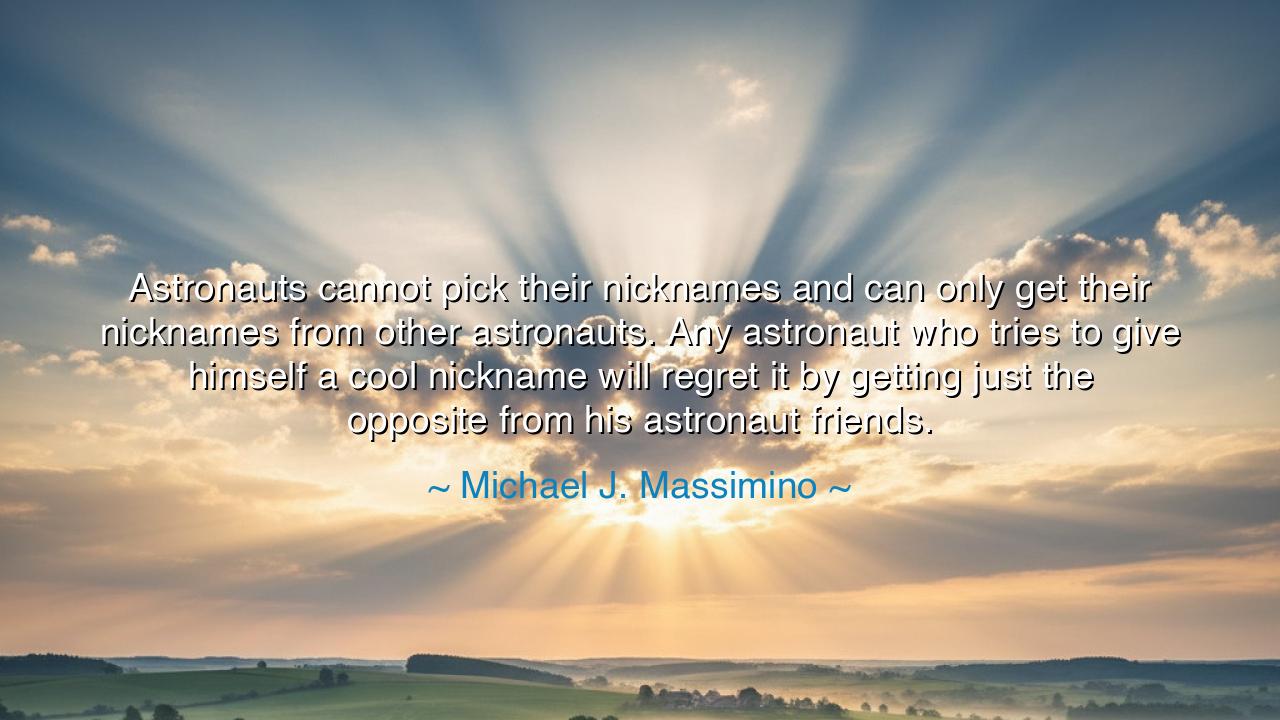
Astronauts cannot pick their nicknames and can only get their
Astronauts cannot pick their nicknames and can only get their nicknames from other astronauts. Any astronaut who tries to give himself a cool nickname will regret it by getting just the opposite from his astronaut friends.






"Astronauts cannot pick their nicknames and can only get their nicknames from other astronauts. Any astronaut who tries to give himself a cool nickname will regret it by getting just the opposite from his astronaut friends." These words spoken by Michael J. Massimino speak to the timeless principle that true recognition, true honor, and true identity are not something we can assign to ourselves. In every age, whether among warriors, philosophers, or scholars, there has been a deep understanding that our true worth is not determined by our own claims or desires but by how others perceive and recognize us. A name—especially a nickname—is a reflection of how we are seen by those who walk beside us, and it is earned through respect, camaraderie, and the shared experiences we create with others.
In ancient societies, the greatest warriors did not choose their own titles. Achilles, the hero of the Iliad, did not name himself “the greatest of all warriors”—his peers and enemies did, through their recognition of his prowess and valor in battle. Similarly, the great philosophers of ancient Greece did not dub themselves “wise” or “enlightened.” It was their followers and those who studied their teachings who bestowed upon them titles like Socrates the wise or Plato the revered, titles that emerged from the respect they earned through their deeds and actions, not their self-proclaimed greatness.
The idea of a nickname being bestowed by peers, rather than chosen, is rooted in this ancient wisdom. It teaches us that true recognition comes not from our own ambitions or vanity but from the collective acknowledgment of those around us. In this way, a nickname is not simply a label—it is a badge of honor, a symbol of what we stand for and how we are seen by those who truly understand us. When we seek to define ourselves solely through our own terms, we risk misunderstanding, even ridicule, for we have not yet earned the respect of others.
Consider the story of Alexander the Great, who conquered vast lands and earned many titles, yet his true strength was in how his soldiers and fellow generals viewed him. He was not just a conqueror; he was a leader, admired for his strategic brilliance and his ability to inspire loyalty in his men. His peers, those who fought alongside him, gave him the title of “Great” because they had seen his deeds in action, and through their shared experience, they recognized his unique qualities. Similarly, astronauts, by their shared experiences of space, forge bonds that are deeper than any self-proclaimed title. Their nicknames are the result of shared moments, challenges, and camaraderie that can only be earned in the most extreme of circumstances.
In modern times, we see the same principle at work in many professions, particularly in sports and art. A great athlete may have the nickname of “The Legend” or “The Greatest,” but it is not the title they chose for themselves; it is the world that recognizes it, built on a foundation of performance and dedication. Just as Michael Jordan earned the title of “Air Jordan,” so too did LeBron James earn his reputation as “King James”—these names were forged through their actions, not their desire for personal grandeur.
Massimino’s words reflect a deeper truth: that we are all, in some way, subject to the judgment of our peers. Self-proclaimed greatness is often met with resistance, for it lacks the humility and authenticity that come from genuine recognition. Just as an astronaut may seek a cool nickname, only to be met with playful humility from their peers, so too must we understand that true recognition is not something we can force upon ourselves. It is earned through the respect and bonds we create with those around us.
The lesson here is clear: humility and authenticity must be the foundation of how we present ourselves to the world. Self-assertion without earned respect often leads to disappointment, while true honor is given by others, born from a life well-lived and actions well-performed. Let us, then, focus on earning the respect of those around us, cultivating genuine relationships, and letting our actions speak louder than our words. Only then will we earn the recognition that truly defines us—whether in the form of a nickname, a title, or the deeper acknowledgment that shapes our legacy.






AAdministratorAdministrator
Welcome, honored guests. Please leave a comment, we will respond soon